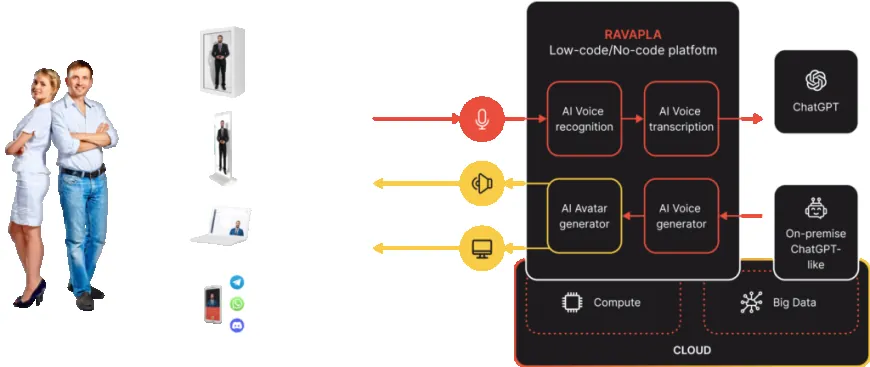According to the Market Statsville Group (MSG), the global 3D avatar solution market size is expected to grow from USD 139.2 million in 2023 to USD 2,040.0 million by 2033, at a CAGR of 30.8% from 2023 to 2033.
With the increasing adoption of remote work and virtual meetings, businesses are seeking innovative ways to enhance engagement and create immersive experiences. 3D avatars provide a more interactive and lifelike presence, enabling users to express emotions and engage in virtual environments. Further, the gaming industry has been a significant contributor to the 3D avatar solution market's expansion. Game developers are incorporating advanced avatar customization features and realistic animations to provide gamers with highly immersive and personalized experiences. The increasing demand for virtual reality gaming and eSports is expected to fuel the growth of the 3D avatar solution market even further.
In addition, the use of 3D avatars in healthcare and education is gaining traction. Medical professionals are leveraging avatars for telemedicine, patient education, and training purposes, allowing for improved communication and enhanced learning experiences. Educational institutions are also utilizing 3D avatars to create interactive virtual classrooms and simulations, enabling students to engage in immersive and personalized learning environments.
Definition of the Global 3D Avatar Solution Market
The 3D avatar solution involves various elements, including advanced computer graphics, animation techniques, motion capture systems, and artificial intelligence algorithms. These technologies work together to generate highly realistic and customizable avatars that can be used in a wide range of applications. In a 3D avatar solution, users have the ability to create and personalize their avatars, customizing their appearance, clothing, accessories, and even behavior. The solutions may offer a user-friendly interface that allows individuals to easily modify and adapt their avatars to reflect their own unique identity.
Scope of the Global 3D Avatar Solution Market
The study categorizes the 3D avatar solution market-based on component, model, and end-user area at the regional and global levels.
By Component Outlook (Sales, USD Million, 2019-2033)
By Model Outlook (Sales, USD Million, 2019-2033)
- Stylized
- Realistic
- Futuristic
By End-User Outlook (Sales, USD Million, 2019-2033)
- Media and Entertainment
- Healthcare
- Fashion
- Others
By Region Outlook (Sales, USD Million, 2019-2033)
- North America
- US
- Canada
- Mexico
- Europe
- Germany
- Italy
- France
- UK
- Spain
- Poland
- Russia
- The Netherlands
- Norway
- Czech Republic
- Rest of Europe
- Asia Pacific
- China
- Japan
- India
- South Korea
- Indonesia
- Malaysia
- Thailand
- Singapore
- Australia & New Zealand
- Rest of Asia Pacific
- South America
- Brazil
- Argentina
- Colombia
- Rest of South America
- The Middle East & Africa
- Saudi Arabia
- UAE
- South Africa
- Northern Africa
- Rest of MEA
Direct Purchase Report: https://www.marketstatsville.com/buy-now/3d-avatar-solution-market?opt=3338&utm_source=free&utm_medium=harsh
Media and entertainment segment accounts for the largest market share by Application
Based on application, the market is divided into media and entertainment, healthcare, fashion, and others. The media and entertainment segment accounted for the largest market share in 2022. In the film and television industry, 3D avatars are extensively used for character animation and visual effects. They enable filmmakers to create lifelike digital characters, creatures, and environments, enhancing storytelling and pushing the boundaries of imagination. 3D avatars in animated movies and TV shows have become increasingly common, allowing for more realistic and immersive animated experiences.
North America accounted for the largest market share by Region
Based on the regions, the global 3D avatar solution market has been segmented across Europe, North America, the Middle East & Africa, Asia-Pacific, and South America. North America accounted for the largest market share in 2022. Technological advancements and infrastructure development in North America have played a crucial role in driving the demand for 3D avatar solutions. The region is known for its advanced computer graphics and animation technologies, which have paved the way for realistic and immersive avatar experiences. Additionally, the availability of high-speed internet connectivity and the widespread adoption of digital devices have created a conducive environment for the utilization of 3D avatars.
Competitive Landscape: Global 3D Avatar Solution Market
The 3D avatar solution market is a significant competitor and extremely cutthroat in the sector is using strategies including product launches, partnerships, acquisitions, agreements, and growth to enhance their market positions. Most sector businesses focus on increasing their operations worldwide and cultivating long-lasting partnerships.
Major key players in the global 3D avatar solution market are:
- Adobe
- Autodesk
- Epic Games
- Genvid Technologies
- Google
- Unity Technologies
- Varjo
- Viveport
- CEEK VR
- IKinema
- MetaverseMe
- Mixamo
- My3DAvatar
- Ready Player Me
- Second Life
- Sketchfab
- VSeeFace
- Wolf3D
Global 3D Avatar Solution Market Dynamics
Drivers: Increasing popularity of virtual communication and digital platforms
Virtual communication platforms, such as video conferencing tools and virtual collaboration platforms, have become essential in today's digital landscape. These platforms aim to bridge the gap between physical and virtual interactions, allowing people to connect and collaborate seamlessly, regardless of their geographical locations. By incorporating 3D avatars into these platforms, users can express themselves more effectively, as avatars can mimic human gestures, expressions, and movements. This leads to a more engaging and interactive communication experience. Further, the rise of digital platforms for entertainment, gaming, and social media has further fueled the demand for 3D avatar solutions. People are seeking more immersive and personalized experiences in these virtual realms. By using 3D avatars, individuals can create digital representations of themselves that closely resemble their real-life counterparts. This enables them to interact with others in virtual environments, participate in multiplayer games, and engage in social media interactions with a heightened sense of presence.













